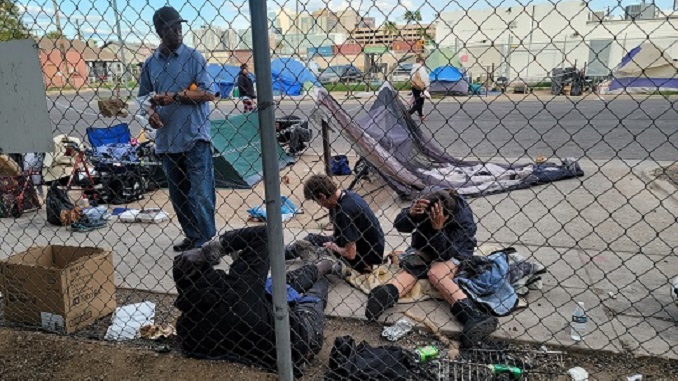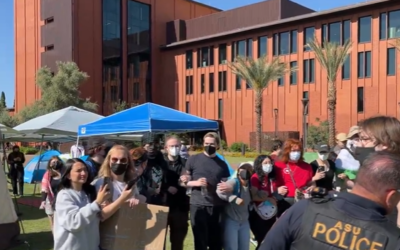By Corinne Murdock |
The Maricopa County Superior Court ruled on Wednesday that the city of Phoenix violated the law by enabling the existence of the infamous mass homeless encampment downtown known as “The Zone.”
Judge Scott Blaney declared in his ruling that the city displayed utter disregard for law-abiding citizens, instead issuing preferential treatment to the homeless by tolerating lawbreaking.
“[I]n their zeal to assist homeless individuals occupying the Zone, City personnel appear to be utterly indifferent to the plight of the City’s constituent property owners, their families, and small business owners that are attempting to make a living,” said Blaney. “The City’s refusal to meaningfully enforce statutes and ordinances in the Zone has created a classic siren song to certain individuals that are enticed at their peril by the Zone’s drugs, sex, and lack of societal rules.”
READ OUR PAST INVESTIGATIONS ON THE ZONE HERE
Blaney ordered the city to clear The Zone by Nov. 4, and keep the area clear of encampments and biohazards associated with the homeless (public defecation, drug paraphernalia, trash) thereafter. Blaney directed counsel for all parties to reconvene on Nov. 30 to review the city’s compliance with his order.
Blaney ruled that the city “intentionally” stopped or materially reduced the enforcement of criminal, health, and quality-of-life laws in The Zone; transported homeless individuals into The Zone with taxpayer-funded “courtesy rides” from police officers and community partners like Community Bridges; and generally allowed and even encouraged the occupation of The Zone.
As such, Blaney said the city was to blame for the increase in violent crime, organized crime, public drug use, biohazards, property crimes, prostitution, public indecency, fire hazards, blocked rights of way, environmental deterioration, and businesses’ decline.
The judge noted that prior to 2018, homelessness was limited, encampments weren’t present in the area, and residents considered the area safe. The ruling traced The Zone’s origins to early 2019, when current Mayor Kate Gallego assumed office.
A major argument presented by the city for their neglect of The Zone was a lack of shelter beds. Blaney declared the city failed to provide credible evidence of this claim; he also pointed out that there’s an unknown number of homeless individuals who are homeless by choice. City representatives admitted at trial that they determine whether an individual is “involuntarily homeless” based on self-reporting, not an investigation into that individual’s case. Some, as Blaney said, could well have the means to secure shelter through government benefits or a disability pension.
City representatives also admitted in testimony that it was their strategy to not prosecute individuals within The Zone for any crimes committed. The representatives relied on euphemistic language to describe their decriminalization approach, expressing that they “would prefer” those individuals to not “become justice involved.”
Blaney determined that the city’s approach essentially legalized all crime for any individual within The Zone.
“[I]f a homeless individual is confronted for an alleged crime, the city’s strategy is to pursue services for the individual instead of a conviction,” said Blaney.
As reported by AZ Free News and told to the residents who sued the city, police officers were advised that “the Zone is off-limits to enforcement.” Blaney also noted that the city appeared to reverse this policy of keeping police out of The Zone following his preliminary injunction earlier this year.
Blaney also detailed police’s delayed response to emergency calls, resulting in non-actions like asking a homeless individual to leave private property but refusing to remove those offenders from public easements or sidewalks adjacent to the property, even if that individual was intoxicated or high on drugs.
The mass encampments grew from an impasse of “service resistant” homeless that apparently stumped the city with their preference to life on the streets. These “service resistant,” reportedly didn’t want to follow the rules of the shelters by giving up their contraband of drugs and weapons, their pets, their partners, or the many possessions they’d accumulated that wouldn’t fit in the shelter space. According to a 2022 survey of the homeless conducted by the city, nearly 20 percent expressed this sentiment.
It’s likely the “service resistant” recognized that they could have the best of both worlds: three meals a day and a steady supply of other resources, like heat relief or hygiene packs provided by the city at no cost with no questions asked, and the ability to live “rule-free” and partake in all the drugs, alcohol, and prostitution they desired without fear of punishment from law enforcement.
“Although unthinkable for the general public, there are many individuals in the Zone that choose to live in a tent on the sidewalks or in the street, with three meals each day provided by the Human Services Campus and the ability to engage in antisocial behavior and drug use,” observed Blaney.
The city defended their inaction over the impasse. Their witness, Sheila Harris, attempted to convince Blaney of her plan to implement “permanent supportive housing” or “housing first,” in which homeless individuals are given the housing and then all other problems, like drug addiction, are dealt with afterward. Harris was credited as the main expert behind the city’s current approach in solving homelessness.
Blaney rejected Harris’ proposal. He sided with the perspective that the enforcement of laws resulted in more law and order, not less.
Blaney said that Harris’ “unusually soft” and “more expensive” approach wouldn’t come close to solving the causes behind homelessness or the myriad of dangers they’ve created, namely mental health and drug issues. Rather, Blaney pointed out that the increased enforcement of laws and interventions have proven to incentivize the homeless to either return to live with friends or family, move into transitional housing, or move to other cities with “more permissive laws” and no camping bans.
“According to Dr. Harris, the City of Phoenix’s plan, which she helped create, uses less enforcement and instead looks to an individual’s wants and needs,” said Blaney. “Although the Court agrees that all individuals, homeless or not, deserve to be treated with dignity, the Court does not believe that Dr. Harris’ unusually soft approach to addressing the dangerous and chaotic conditions in the Zone would be effective.”
Blaney also expressed doubt in the city’s estimation that 70 percent of individuals accepted services which translated into a permanent movement from the streets. The judge said that number was potentially misleading, noting that the city wasn’t able to disclose how many of those individuals accepted a “free hotel room for the night” before returning to The Zone the next day.
Unlike the homeless, the city would enforce laws on regular citizens, Blaney noted. The judge pointed out the irony of the city’s arbitrary enforcement of right-of-way law in its handling of a local business who took the opportunity presented by some gas line work to install sculptures in a spot where the homeless had been encamped. Yet, the city took no issue with the homeless encampment in the same spot also in violation of right-of-way law.
Corinne Murdock is a reporter for AZ Free News. Follow her latest on Twitter, or email tips to corinne@azfreenews.com.








